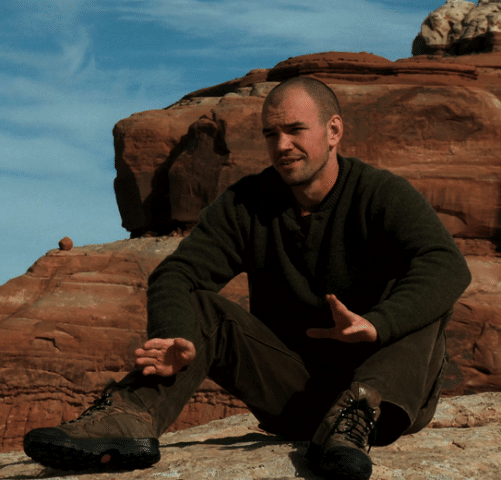Climate activist Tim DeChristopher is set to be released from prison on Earth Day, this Sunday April 21st, since being incarcerated on July 26, 2011.
Tim DeChristopher created quite a ripple in the activist community when he tried to buy millions of dollars of land in December of 2008 in order to stop the oil and gas industry from snatching it up at an illegitimate auction put on by the outgoing Bush administration. While the incoming Obama administration cancelled the auction, Tim was caught in the fallout, while the rest of the auctioneers presumably roam free.
He was slapped with two federal felony charges – one for making false statements and violating the Federal Onshore Oil and Gas Leasing Reform Act.
Tim’s trial was pushed back 6 times over two years and was fraught with maddening plot twists. The judge refused to let Tim use the Necessity Defense or let the jury know crucial facts, including that the auction was illegal. Tim was also prohibited from testifying on how he acted on moral convictions relating to climate change.
His prison term was no less eventful. During March of last year, Tim was thrown in isolated confinement for two and a half weeks after writing correspondence that the Bureau of Prisons (BOP) deemed potentially harmful because it contained the word “threat.” It turned out he was only “threatening” to return a potential legal fund donation from a company whose ethics weren’t aligned with his own.
Rumors went around that an unnamed Congressman had put in the order, but investigations never figured out if it was true.
Tim was eventually returned to the general population after a massive effort by supporters demanded the prison to put him back. Some speculated the move was a tactic by the BOP to further restrict his communication with the outside world.
It’s not the first (nor the last) time an activist has been censured for political speech. Just a few weeks ago, former ELF participant, Daniel McGowan, was taken back into custody after penning a Huffington Post article about documents shedding light on his incarceration in a Communication Management Unit (CMU).
The government attempting to suppress individuals’ freedom of speech is often a constant thread when activists get put on trial and has been especially prevalent during Tim’s trial, sentencing, and time in prison.
Legal documents from Tim’s sentencing indicate that the main reason for Tim receiving jail time was not necessarily because his crime was heinous, but rather because of what he said after his conviction. The government’s prosecutors proposed 7 years incarceration in order to “be sure, a federal prison term here will deter others from entering a path of criminal behavior.”
Judge Dee Benson, the Utah judge presiding over the case, stated during the sentencing hearing that Tim may not have received any time if he hadn’t roused the crowd on the steps of the courthouse after being issued a guilty verdict. Or if he hadn’t further continued to address audiences around the country afterward about total system change, overthrowing the fossil fuel industry, and creating an economy that works better for everyone instead of protecting the interests of a small percentage of ultra wealthy.
In an exclusive interview with DeSmogBlog during the summer of 2011, before his sentencing, Tim stated,
“I think by putting more power into the hands of human beings, whether that’s through community groups, whether that’s through local politics, whatever that may be, I think shifting that power structure will put more power in the hands of people, that is going to make [the transition away from a dependency on fossil fuels] more humane… When people are less dependent on our industrial economy, they’re more liberated to stand up to the injustices of that industrial economy and create their own power. When people are providing for more of their own needs, whether it’s energy or transportation or food and water, the more that people are providing for their own needs the more liberated they are to challenge existing power structures because they’re not dependent on them anymore.”
His trial brought up further questions about injustice in democracy, accountability for real climate criminals, and what climate activists are willing to put on the line for the right to a sustainable future.
“That’s where movements in the past have been successful – they’ve trusted that their actions are going to inspire others, that they are connected to something much larger than themselves. I think civil disobedience should be celebrated. I’m extremely grateful that I’m supported by so many people. [But] I’m not going to save anybody. I mean, there’s this fine line between people celebrating what I did because it inspires them to join me, and people that celebrate what I did because it makes them feel like they can sit back, and somebody else is going to do what needs to be done… I think one of the points where we’ll get really strong is when people take their own initiative and go after certain targets, and if one of them gains traction, then the rest of us as a movement get behind it. That’s where we can start moving more quickly, is if people don’t wait for [others] to tell them what to do, and they go and do something. And if it starts going somewhere, we’re all going to be behind it.”
Considering DeChristopher’s message about collective action, it’s quite amazing to consider his release from prison lands right on Earth Day.
Tim has been living in a halfway house in Salt Lake City since October and will be released early based on good behavior. The documentary based on his case, “Bidder 70”, will be shown nationwide on Monday night.
Tim will speak publicly for the first time since being incarcerated. The Q&A will be held in Salt Lake, but will be broadcast over the internet, where participants can submit questions via Twitter.
Subscribe to our newsletter
Stay up to date with DeSmog news and alerts






